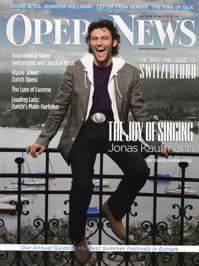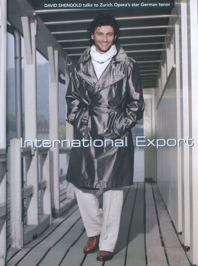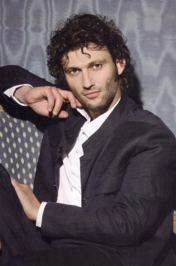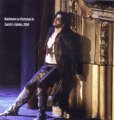|
|
|
|
|
|
|
| Opera News, May 2008 |
| David Shengold |
International Export
|
| David Shengold talks to Zurich's Opera star
German tenor |
|


 |
|
Fotos: Johannes Ifkovits |
Jonas Kaufmann
offers more than just a tall slim physique, handsome features
and Romantic-era dark curls, more than a centered, comfortable aura
onstage. What sets Kaufmann apart from many currently touted tenors is his
specificity: he doesn’t always play himself or drown his characters in
generalized hyper-enthusiasm but crafts a different persona, not only for
different roles but for different stagings of the same piece. On the vocal
plane, this clarity of intention translates to a firm line, unfudged
agility in bravura passages and superbly clear diction delivered with a
baritonally-based tenor that can rise into gold-tipped high notes with a
visceral thrust.
 Alfredo in La Traviata at the Met, where he has sung the role fourteen
times in three seasons, remains the point of reference for most New
Yorkers on Kaufmann. (His only other Met showcase to date was a trio of
fine Taminos in Die Zauberflöte in 2006.) He retains the Verdi in his
expanding repertory and has done high-profile Traviata productions during
the past year with Christine Schäfer in Paris and Anna Netrebko in London.
His Met Alfredos have wooed Angela Gheorghiu, Krassimira Stoyanova, Ruth
Ann Swenson, Ermonela Jaho and Mary Dunleavy. Alfredo in La Traviata at the Met, where he has sung the role fourteen
times in three seasons, remains the point of reference for most New
Yorkers on Kaufmann. (His only other Met showcase to date was a trio of
fine Taminos in Die Zauberflöte in 2006.) He retains the Verdi in his
expanding repertory and has done high-profile Traviata productions during
the past year with Christine Schäfer in Paris and Anna Netrebko in London.
His Met Alfredos have wooed Angela Gheorghiu, Krassimira Stoyanova, Ruth
Ann Swenson, Ermonela Jaho and Mary Dunleavy.
Kaufmann’s impressive new Decca CD, Romantic Arias, exhibits the dynamic
range and flexibility of his dark yet shining sound, as well as his ease
in switching among Italian, French and German —this is one tenor who
doesn’t stint on text. He gives new life to Martha’s hackneyed “Ach, so
fromm”; his rendition of Manon’s Saint Sulpice aria blends passion and
control in an irresistible balance that befits des Grieux’s torn state.
This versatility is evident onstage, as well. One November weekend at
Zurich Opera, his home base, showed two character portraits strikingly
different not only from his callow if dashing Alfredo but from one
another. In Humperdinck’s Königskinder, he ably executed Jens-Daniel
Herzog’s lithe, athletic conception of his part. An initially merry
wanderer climbing on tables and down ladders, this was the Prince as
dream-date backpacker.
 On another night, he sang the title role in a four-act Don Carlo.
Kaufmann, despite his princely figure, splendid vocal ease and
incisiveness, was unafraid to draw the troubled Carlo as a passive,
distraught figure, caught in his own inner world. Even when Posa was shot,
this Carlo made no move to comfort or even look at his dying friend. The
tenor commented later, “Carlo just can’t take in what is beyond himself. I
think that scene is hard for some in the audience, who come wanting
heroics out of Schiller.” This withholding, forlorn dramatic conception
paid off in the Escorial duet: Kaufmanns conscience-awakened prince
finally made electric emotional and physical contact with Joanna
Kozlowska’s commanding Elisabetta. At the end, Kozlowska and Matti
Salminen (Filippo) won cheers, but the response to local hero Kaufmann was
tumultuous. On another night, he sang the title role in a four-act Don Carlo.
Kaufmann, despite his princely figure, splendid vocal ease and
incisiveness, was unafraid to draw the troubled Carlo as a passive,
distraught figure, caught in his own inner world. Even when Posa was shot,
this Carlo made no move to comfort or even look at his dying friend. The
tenor commented later, “Carlo just can’t take in what is beyond himself. I
think that scene is hard for some in the audience, who come wanting
heroics out of Schiller.” This withholding, forlorn dramatic conception
paid off in the Escorial duet: Kaufmanns conscience-awakened prince
finally made electric emotional and physical contact with Joanna
Kozlowska’s commanding Elisabetta. At the end, Kozlowska and Matti
Salminen (Filippo) won cheers, but the response to local hero Kaufmann was
tumultuous.
Kaufmann believes passionately in opera as theater. “Even the ‘out-there,’
less conventional productions provide different angles on characters that
I can store within me and call upon in more traditional stagings,” he
says. But he feels strongly that successful Regietheater must obey certain
rules. “It must be interesting and sustain the psychological
“I am very open to innovation, but just to provoke, to seek attention of
the media, as often happens, is not acceptable.”
tensions among the characters — otherwise you’re just standing there,
boring for everybody. Also, you must assume that some are seeing an opera
for the first time. The plot must be clear, and you can’t chop the music
into bits, shake it around just to amuse those who know operas well, or
you’ll never see first-time operagoers again! I am very open to
innovation, but just to provoke, to seek attention of the media, as often
happens, is not acceptable.”
The tenor’s career outside of small parts in his native Munich began with
two frustrating, overworked years at Saarbrücken, starting in 1994, with
crumbs such as Remendado (Carmen) and Andres (Wozzeck) not making up for
an uncongenial atmosphere. Two positives for Kaufmann were being within
range of French bistros across the border and — more crucially — meeting
his wife, mezzo Margarete Joswig. The couple has three children now;
Matteo is just two, but his two older siblings attend the opera.
“Charlotte, who is nine, sometimes runs in and out and gets bored. I
remember a Flute here in Zurich some years ago. At the end of the Pamina
aria, I heard a loud slamming door, which is really not nice, since the
music is so beautiful at that point. Turns out it was my daughter, coming
to tell me she was so angry at me for not saying anything. ‘How could you,
when she sang so beautifully?’ She hated me for that! But Flavio [at age
four] is completely focused. When we were doing Traviata in Paris, he sat
alone for hours right next to the pit, next to Sylvain Cambreling, who
conducted. He said, ‘What did you do to that boy? He sat there the whole
time with no noise!’”
Kaufmann first appeared with Zurich’s ensemble in September 2000, as
Florestano in Paer’s Leonora in the subsidiary theater at Winterthur.
Tamino on the main Zurich stage followed shortly. Carefully cultivated by
music director Franz Welser-Möst, who terms him “a really bright light in
the tenor world,” Kaufmann undertook both supporting and leading roles in
Zurich, with wisely chosen guest stints in prominent theaters elsewhere.
(He had already bowed in lighter parts such as Jacquino at major venues,
including La Scala, Brussels and Hamburg.) September 2001 brought his
American debut at Lyric Opera of Chicago, opening the season as Verdi’s
Cassio. Among U.S. companies, Lyric maintains the strongest allegiance to
Kaufmann, who returned for Alfredo in 2003 and opens the coming season in
September opposite Natalie Dessay in Manon.
When Kaufmann is onstage in Zurich, one senses the two-way communication
with a supportive audience. The fact that he has achieved artistic
maturity in Zurich is a source of great civic pride, and Kaufmann in turn
is deeply grateful for the artistic development Zurich has afforded him.
He also likes the city for the winter sport opportunities it offers his
children — and because people don’t pester him. “It’s a Swiss tradition,
this politeness,” he laughs. “Tina Turner lives here — she shops at the
markets, and no one disturbs her—so they certainly don’t bother with me!”
The fact that Kaufmann has achieved artistic maturity in Zurich is a
source of great civic pride.
One way to appreciate Kaufmann’s contribution as a worldclass member of
Zurich Opera is to screen his performances on DVD. Nikolaus Harnoncourt’s
Fidelio (filmed 2004) sharply divides critical opinion as to tempos and
casting, but Kaufmann’s Florestan is terrific — a believably gaunt, noble
figure combining the musicianship to cope with Beethoven’s challenges with
tonal beauty and Vickers-like intensity. His voice shares Vickers’s sexy
throb, and Kaufmann confides that Britten’s Grimes is another longtime
goal.
 Under the pioneering Harnoncourt, Kaufmann has successfully undertaken
Monteverdi roles. He credits Harnoncourt along with Welser-Möst among the
conductors who have had the most formative influence on him. “Harnoncourt
always shows you an aspect of interpretation of a piece you would never
expect to find. When we did Fidelio, it was really great — you could hear
details, lines and melodies in the orchestra I had never heard before.
With us, sometimes he felt some text was less relevant. He wanted to hear
clearly one line of Florestan (rather than Leonore or Rocco) in the
second-act Terzett, saying, ‘There, that’s the saxophone solo — you others
are the drums.’ Always a very unconventional way of describing things, so
you remember it in performance.” Under the pioneering Harnoncourt, Kaufmann has successfully undertaken
Monteverdi roles. He credits Harnoncourt along with Welser-Möst among the
conductors who have had the most formative influence on him. “Harnoncourt
always shows you an aspect of interpretation of a piece you would never
expect to find. When we did Fidelio, it was really great — you could hear
details, lines and melodies in the orchestra I had never heard before.
With us, sometimes he felt some text was less relevant. He wanted to hear
clearly one line of Florestan (rather than Leonore or Rocco) in the
second-act Terzett, saying, ‘There, that’s the saxophone solo — you others
are the drums.’ Always a very unconventional way of describing things, so
you remember it in performance.”
On the musical side of things, Kaufmann has been enjoying his work with
Anthony Pappano, music director of the Royal Opera, Covent Garden. The
collaboration dates from a 2002 European tour of La Damnation de Faust.
“My dream-come-true of conductors at the moment is Tony Pappano — always
fantastic, maybe because my idea of interpretation is very dose to his.
The freedom he gives me is so important. He doesn’t force you to watch
him. The idea is, ‘You do something great, and I’ll be there with the
orchestra.’ Of course, within limits — no huge rubato or fermata just
because I have those high notes! — like Corelli, whom I enjoy, on early
recordings, heroic but not stylish. But within those limits, Pappano is
like a dream. He’ll be there [this month in London] for my first Tosca. I
specified that for my debut as
 Cavaradossi.” Kaufmann came to Covent
Garden as Ruggero in 2004’s La Rondine, opposite Gheorghiu. Pappano
brought him back for one of the most anticipated, and most ecstatically
received, role debuts in opera last season — Kaufmann’s José opposite Anna
Caterina
Antonacci’s Carmen in Francesca Zambello’s spectacular new Carmen in
December 2006. Cavaradossi.” Kaufmann came to Covent
Garden as Ruggero in 2004’s La Rondine, opposite Gheorghiu. Pappano
brought him back for one of the most anticipated, and most ecstatically
received, role debuts in opera last season — Kaufmann’s José opposite Anna
Caterina
Antonacci’s Carmen in Francesca Zambello’s spectacular new Carmen in
December 2006.
Kaufmann found this Carmen revelatory. “Everyone felt emotionally
extremely connected to this production. It really came alive — like a
movie, nothing stagy — for us too. Months later, I met Anna Caterina in
Paris. She too said that everything after it felt so artificial compared
to what we felt there. It was just on BBC TV — so look for it on the black
market! One of the best things I’ve done.” An urgent, velvet-masking-steel
flower song proves another highlight of Romantic Arias. Kaufmann returns
to José late next month in a new Zurich staging opposite Vesselina
Kasarova. Kaufmann returns
to José late next month in a new Zurich staging opposite Vesselina
Kasarova.
Many have compared Kaufmann to Fritz Wunderlich, an idol whose “Granada”
furnishes the young tenor’s cell-phone tone. But Kaufmann also expresses
great admiration for Plácido Domingo and Vickers and their fusion of music
and drama. He, too, plans toward Otello — but slowly. “First, perhaps,
things like Luisa Miller. We must see how ‘heavy’ the voice becomes
naturally.” He cites Wolfgang Windgassen, who always kept Tamino in his
repertory at Stuttgart, his home theater, to preserve vocal flexibility
while singing Tristan and Siegfried on the world’s great stages.
As time permits, Kaufmann programs recitals with his erstwhile professor
Helmut Deutsch, in whom he pronounces complete faith; their recent Richard
Strauss CD on Harmonia Mundi won deserved acclaim. “I hope to show this
side of myself to America, too,” says Kaufmann, who also expresses
frustration about not returning to New York more quickly in different
repertory. “I think I had a good success as Alfredo. People were very
nice, but nobody asked for anything, and I have gotten busy elsewhere.
When Peter Gelb’s planning kicks in, that will change!” he grins. Having
tried out Parsifal in Zurich and Walther von Stolzing (in concert) at the
Edinburgh Festival, he’ll add his next Wagner hero, Lohengrin, for Munich
(2009). Then, for the Met’s projected new production in 2011, Kaufmann
will take on Siegmund — a key Vickers and Domingo role. Another one in the
works is Berlioz’s Énée ‘After I looked at the score, I listened to
Vickers, since he did it best!”
Talking with this ebullient but keenly practical tenor, who is not yet
forty, about his future is a heady experience. Many other parts attract
him. “Maybe a few years after Siegmund, the Götterdämmerung Siegfried —
but there is no rush. With Siegfried, the problem is after singing all
night you get blown away by a fresh soprano! Un Ballo in Maschera would be
a great thing to grow into. I wish I could do Lenski right now. But Queen
of Spades — that’s a fantastic part. With Janáček, there’s Laca, and the
wonderful Mr. Brouček. Lots of challenges!” |
|
|
|
|
|
|
|
|
|
|
|
|
|
|
|
|
|